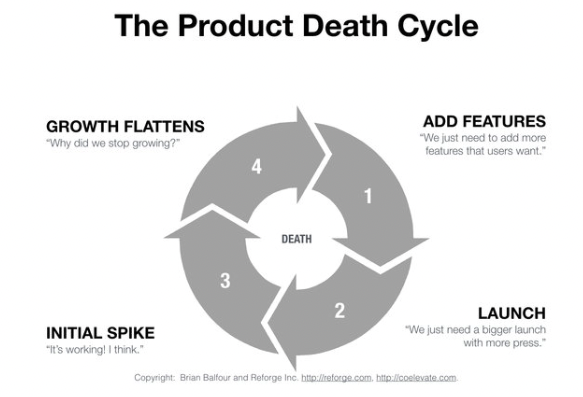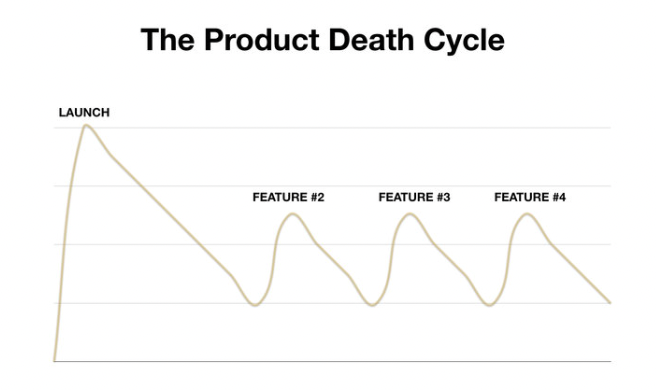HogMail #21: Avoiding the "Product Death Cycle"
Feb 13, 2023

Welcome to HogMail, our newsletter featuring the best of the PostHog blog, tutorials, product guides, and curated articles on building great products and companies. We send it every two weeks. Signup here so you don't miss it.
In HogMail #20, we looked at a failed startup with product-market fit and 500k active users. So, what comes after product-market fit? More on that soon, but first...
Here's what's new on PostHog.com:
- Raquel Smith on Why 'Product Engineer' is the most fun role I've had in tech
- Andy Vandervell on Retention vs Churn Rate: Your guide to churn analysis
- Ian Vanagas on How to use the PostHog API to get insights and persons
- Abe Basu on Automating user journeys with PostHog and Laudspeaker
Words by Andy Vandervell, whose retention is rapidly declining with age. 😢
Avoiding the "Product Death Cycle"
If product-market fit isn't enough to succeed, what do you need? In a 2017 article, Brian Balfour says:
"The “go-to” answer for almost every question in startups, is “build a great product.” Every time I hear that answer it feels completely unsatisfied. Building a great product is a piece of the puzzle, but it’s far from the full picture."
He goes on to argue this mentality can lead to what he calls the Product Death Cycle:

In this model, the answer to "how do we grow?" is always launch new feature, but every new launch is slightly less successful than the last, and doesn't lead to lasting growth:

Instead, he suggests successful startups ($100M+ in his reckoning) should seek four fits:
Market-Product Fit – A variation on product-market fit.
Product-Channel Fit – "Products are built to fit with channels. Channels do not mold to products."
Channel-Model Fit – Channels are determined by your model, i.e. how you charge and average annual revenue per user.
Model-Market Fit – The concept that your market (and # of customers within your market) influence your model."
Balfour makes three final points:
You need to find four fits to grow to $100M+ company in a venture-backed time frame.
Each of these fits influence each other, so you can’t think about them in isolation.
The fits are always evolving/changing/breaking. When that happens, you can’t simply change one element, you have to revisit and potentially change them all.
Full article: Why Product Market Fit Isn't Enough
More good reads
Andrew Chen on The Power User Curve:A16z partner, Andrew Chen, explains a powerful way to discover "if you have a hardcore, engaged segment that’s coming back every day." See also: How to identify and analyze power users in PostHog.
How to find customers willing to talk to you – A useful guide about talking to users. Part 2 covers tactics for running effective user interviews.
11 Laws of Software Estimation for Complex Work – Wrong estimates aren’t your fault, but they are definitely your problem.
How to Measure “Hard-to-Measure” Marketing Channels – Rand Fishkin on how to stop avoiding hard-to-measure marketing channels (e.g. native social, PR, events etc.) by learning how to measure them.

